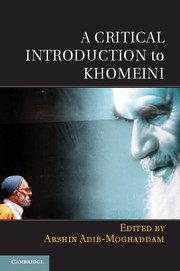Book contents
- Frontmatter
- Contents
- List of Map and Figures
- About the Authors
- Acknowledgments
- Glossary
- Timeline: The Life of Ayatollah Ruhollah Khomeini (1902–1989)
- Introduction Ayatollah Ruhollah Khomeini: A Clerical Revolutionary?
- 1 Khomeini and the “White Revolution”
- 2 The Rise of Khomeinism
- 3 Wilayat al-Faqih and the Meaning of Islamic Government
- 4 Ayatollah Khomeini’s Rule of the Guardian Jurist
- 5 Khatt-e Imam
- 6 Khomeini and the West
- 7 Gendered Khomeini
- 8 Hidden Khomeini
- 9 The Divine, the People, and the Faqih
- 10 Khomeini’s Legacy on Women’s Rights and Roles in the Islamic Republic of Iran
- 11 To Rule, or Not to Rule? An Alternative Look at the Political Life of Ayatollah Khomeini between 1960 and 1980
- 12 Khomeini and the Decolonization of the Political
- 13 Contentious Legacies of the Ayatollah
- Further Reading
- Index
- References
7 - Gendered Khomeini
Published online by Cambridge University Press: 05 June 2014
- Frontmatter
- Contents
- List of Map and Figures
- About the Authors
- Acknowledgments
- Glossary
- Timeline: The Life of Ayatollah Ruhollah Khomeini (1902–1989)
- Introduction Ayatollah Ruhollah Khomeini: A Clerical Revolutionary?
- 1 Khomeini and the “White Revolution”
- 2 The Rise of Khomeinism
- 3 Wilayat al-Faqih and the Meaning of Islamic Government
- 4 Ayatollah Khomeini’s Rule of the Guardian Jurist
- 5 Khatt-e Imam
- 6 Khomeini and the West
- 7 Gendered Khomeini
- 8 Hidden Khomeini
- 9 The Divine, the People, and the Faqih
- 10 Khomeini’s Legacy on Women’s Rights and Roles in the Islamic Republic of Iran
- 11 To Rule, or Not to Rule? An Alternative Look at the Political Life of Ayatollah Khomeini between 1960 and 1980
- 12 Khomeini and the Decolonization of the Political
- 13 Contentious Legacies of the Ayatollah
- Further Reading
- Index
- References
Summary
Introduction
Grand Ayatollah Ruhollah Khomeini modified his rhetoric on women and their rights depending on political circumstances and power relations. His discourse and rulings on women underwent tremendous change from the 1960s, when he rejected the Family Protection Law, to the 1980s, when he was in power and forced to respond to the pleas of Islamist women. The evidence for this can be found in more than 610 decrees, sermons, interviews and political pronouncements that Khomeini issued from 1962 until 1989. Khomeini instrumentalized women and women’s issues in order to oppose the Shah, but became permeable to the demands of Islamist women who wanted more active roles following the Revolution in a society that was undergoing rapid urbanization and modernization. The religious edicts that he delivered on women’s issues as well as his declarations in the aftermath of the revolution reflected the pragmatism of a man in power who was more preoccupied by political considerations and consolidating the Islamic regime than respect for religious precepts or traditions.
Khomeini and the Change in Women’s Legal Status
The legal status of Iranian women underwent change following the Shah’s agrarian reform programme (or the White Revolution) in the 1960s, which was comprised of six measures; one of which was to grant voting rights to women. The Shah intended to decrease the influence of the landowning class, the ulema and the traditional middle class by garnering support for his regime through appealing to the new urban middle class, industrial workers and peasantry. The Shah’s decision to enfranchise women created a scandal in Qom, especially among the leading clergy. Khomeini, the most vocal among them, called the act mendacious and scandalous and sent a telegram to the Shah on October 9, 1962, criticizing women’s involvement in politics as an anti-Islamic measure: “By granting voting rights to women”, Khomeini argued, “the government has disregarded Islam and has caused anxiety among the ulema and the Muslims”. To make their point, the clergy referred to both Islamic law and the Constitutional Law of 1906. They maintained that the admission of women to the two majlis (chamber of representatives and the senate) as well as the municipal and local councils was against Islamic law.
- Type
- Chapter
- Information
- A Critical Introduction to Khomeini , pp. 170 - 192Publisher: Cambridge University PressPrint publication year: 2014
References
- 2
- Cited by



